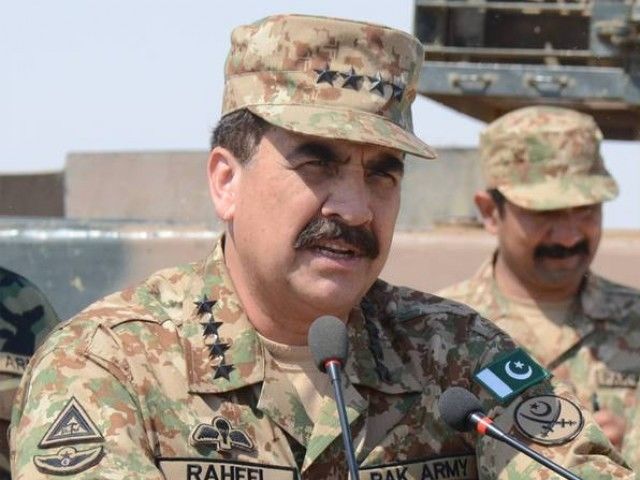Army Chief Gen Raheel Sharif told his commanders that the Quetta attack was an attempt to undermine the successes of Operation Zarb-i-Azb, which is in its final phase.
He had said on Monday that the target of the attack was the China-Pakistan Economic Corridor. “By adopting a whole of nation approach, the armed forces would not allow anyone to reverse our gains against terrorism,” the army chief added.
At the conference, the generals were told that threat was emanating from Afghan soil, which was being managed by Indian intelligence agencies. However, at the same time there was an acknowledgment that a network of ‘facilitators’ within the country provided an enabling environment for the external enemy. [Source: Dawn]
Comment:
The rapidly changing statements of the Pakistan Army Chief as reported here demonstrate how tragic attacks such as that which occurred at Quetta are used for ulterior motives. 73 people have died so far and many more were injured after a bomb attack at a hospital, where a large number of lawyers had gathered after an earlier attack on one of their colleagues. And while labelling the problem as that of domestic ‘facilitators’, it is evident, as acknowledged at the meeting of the Army leadership referenced above, that the attack was primarily launched from Afghan territory and sponsored by Indian intelligence agencies. It was left unsaid that Afghan territory is of course currently in US occupation.
Pakistan’s leadership needs to coldly review the situation that it finds itself in. Is it sufficient to announce operation after operation to eliminate indigenous terrorism when the actual cause of such attacks is India and the US? In addition to the suffering of Pakistani Muslims, tens of millions of Muslims face Indian occupation in Kashmir and American occupation in Afghanistan. Pakistan has been choosing to provide half-hearted covert support while politically adopting a policy of ‘normalisation’ with India and ‘brotherly relations’ with the US-imposed Afghan regime. Pakistan must decide whether it wants to observe ‘international norms’ selectively imposed by the West or whether it wants to truly take control of its own sovereignty and deal directly with the real causes of the region’s problems.
The conflict between India and Pakistan dates right back to their independence from British rule in 1947. The two countries which have fought three wars with each other since then. But other than these wars, the two countries are in a near-perpetual state of proxy war, supporting armed conflict in each other’s countries. Pakistan has provided support for jihad in Kashmir, while India supports nationalist insurrection in Balochistan. Also, Pakistan supported the Afghan Taliban so India, with Afghan regime support, turned to covertly supporting the Tehrik Taliban Pakistan (TTP), which fights against the Pakistan state and is separate from the Afghan Taliban. Jamaat al-Ahrar, which claimed responsibility for the Quetta attack, is an offshoot of TTP that has been involved in one form or another in major attacks on civilians in Pakistan.
The last couple of months have seen a sharp increase in these conflicts and the failure of efforts towards normalisation by Pakistan Prime Minister Nawaz Sharif and Indian Prime Minister Narendra Modi. This failure is natural due to institutional orientation and geopolitical realities: the British-imposed 1947 partition cutting across major Muslim population centres was designed to set the two countries in opposition to each other within the South Asian subcontinent; and, in the present day, America supports India against China, resulting in China supporting Pakistan against India. The latest of many irritants has been that America has supported India for membership of the Nuclear Suppliers Group (NSG), in opposition to China, while declining to make a similar recommendation for Pakistan; meanwhile America pressurises Pakistan to contain the Afghan jihad against US troops.
Despite being deeply aware of these realities, the Pakistani leadership adheres to following Western norms and direction and pursuing its own interests instead of following the interests of Muslims in the region. Pakistan refrains from openly attacking the Indian or US-backed Afghan regimes, instead turning its army after each event against its own citizens in the name of fighting terrorism. These internal operations have resulted in arrests and abductions of tens of thousands of sincere Muslims, thus effecting the criminalisation of Islam and all Islamic movements.
By adopting America’s ‘war on terror’, Pakistan is failing to strike at its real enemies or synchronise its policy direction with the region’s institutional and geopolitical reality. America’s war against Islam, in all its ideological and military dimensions, is a war against Pakistan’s interests also.
Pakistan must abandon America’s war on terror and instead adopt Islam completely. Only by doing so will Pakistan be able to truly align itself with its real interests in this life and the Hereafter.
Faiq Najah

